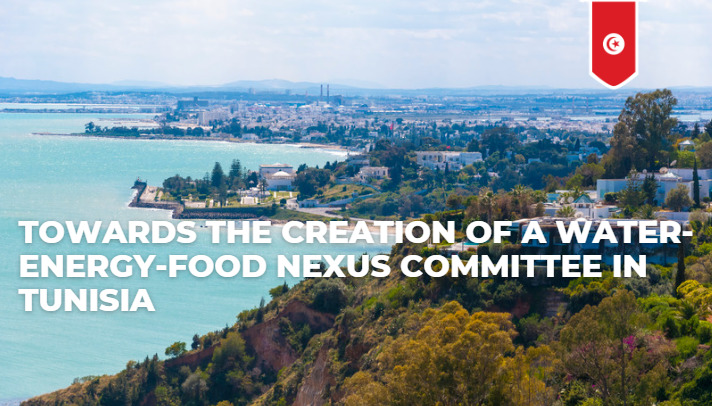 Get the full digital edition of the article ln French et en Arabic
Get the full digital edition of the article ln French et en Arabic
Involved in the WEF-CAP project (Technology Transfer and Capitalization of Water Energy Food Nexus), Femise analyzes the impacts of climate change in the Mediterranean and formulates a series of recommendations to optimize resources. In the third volume of the series of white papers produced within the framework of the project, entitled “Towards the governance of the Water-Energy-Food Nexus in Tunisia in the face of insecurities”, the Forum advocates the creation of a committee, promoting the adoption of an integrated approach in the Water-Energy-Food (WEF) sectors.
“Cooperation between the water, energy and food sectors is essential in Tunisia in the face of environmental challenges and pressure on resources”, explain Olfa Sebai, principal engineer at the National Environmental Protection Agency (ANPE) alongside Maryse Louis and Sophie Dahdouh, experts in Mediterranean socio-economic issues within Femise and authors of the white paper.
Very concrete measures
The last volume of the triptych advocates the creation of a Water-Energy-Food Nexus Committee under the aegis of the National Environmental Protection Agency. This Committee will provide concrete proposals for Tunisia’s Resilience Strategy in 2030. This governance body will have multiple vocations: ensuring the introduction of good practices in the agricultural sector, improving the efficiency of hydroelectric production and the management of water supply system by detecting and repairing leaks. The challenge also concerns the production of biogas, the use of biomass in crops for cogeneration and heating. This Committee will aim to stimulate innovation, R&D through the creation of a dedicated platform and the organization of events to promote good practices and stimulate new partnerships.
Smart management of the Sonede network
Femise also recommends the use of desalination and recycling of wastewater, calls for the promotion of new desalination techniques and advocates the introduction of new intelligent management of resources and the water network of Sonede, the national company in charge of water exploitation and distribution in Tunisia.
Increase the share of renewable energies
Femise invites the country to conduct a rational, sustainable and productive policy while developing a program for the development of renewable energies. “Tunisia must develop an innovative legal and financial framework to improve productivity, while reducing energy consumption and accelerating the development of renewable energies. The country aims to achieve 50% energy autonomy by 2040.
A strengthening of the legal framework on the conservation of water resources and an intensification of cross-border cooperation on the sustainable management of underground water resources are essential. Tunisia must also tighten the management of water demand and put in place saving plans”, emphasize the authors of the white paper.
According to Femise, synergies are essential and the involvement of local actors, the private sector and investors is necessary to achieve the development of adequate policies.
Tunisia is facing the gradual increase in temperatures and a drop in rainfall resulting in increasing land aridity and degradation of soil quality. 16,000 ha of land could become unsuitable for cultivation in 2030 and 38,000 ha in 2050. Worrying corollary: the forecast fall of 30% and 32% in cereal and olive production.
.
Acknowledgment: 
- This article is based on the WEF-CAP White paper No. 3 entitled: https://www.femise.org/en/slideshow-en/water-energy-food-nexus-unexplored-potentials-for-tunisia/
- This Article is produced in the Context of the WEF-CAP Project (THE TECHNOLOGY TRANSFER AND CAPITALIZATION OF WATER ENERGY FOOD NEXUS) and received financial contribution from the ENI CBC Programme which is supported by the European Union through the Grant Agreement nº C_A.2.1_0069 running from 1st of September 2021 to 30th of September 2023.
- The views expressed in this article as those of the authors and do not reflect the views of the ENI CBC MED Programme or their partners.



